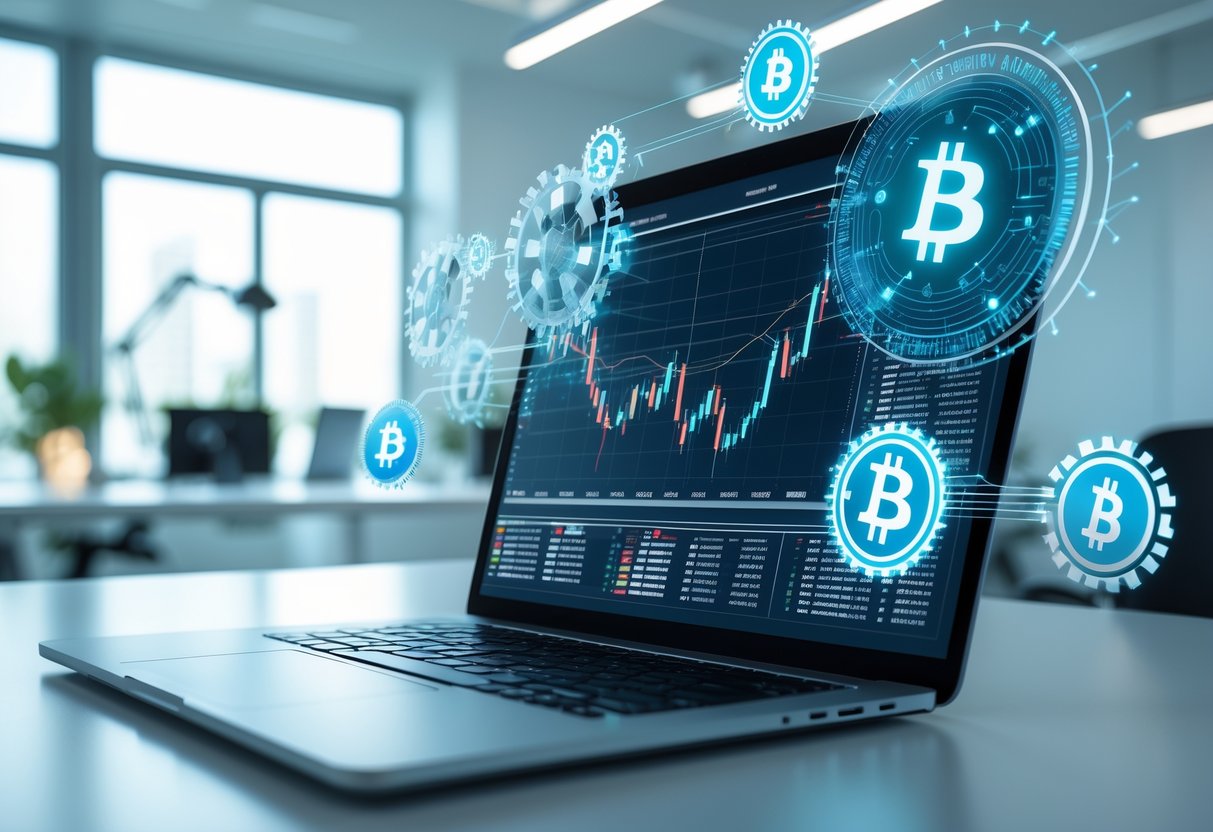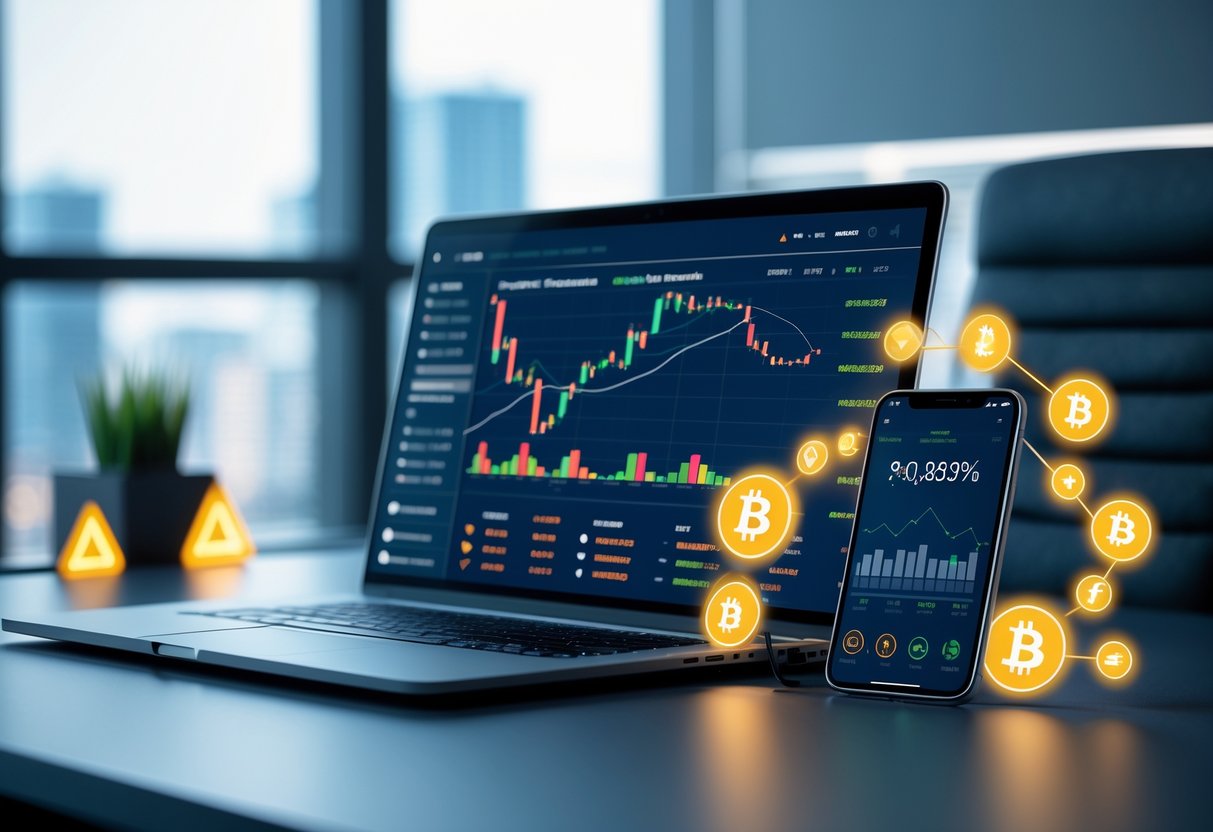
DeFi auto investing lets people grow their crypto without constant work. It uses smart tools to handle the complex parts of cryptocurrency investing. These systems work with blockchain technology to make digital asset management easier.

See Rewards Linked to This Topic—Follow Steps to Get:
Great news—exclusive perks are just a few steps away! Follow these simple actions to unlock bonuses linked to this topic!
How It Works (Fast & Easy!)
1️⃣ Check Your Rewards in Seconds
→ Click Here to See How Much You Qualify For (No commitment!)
First-time withdraw can unlock 7K+ USD.
2️⃣ Connect Your Wallet
Use any mobile or desktop wallet (MetaMask, Trust Wallet, etc.)—approved in seconds!
3️⃣ Cash in Your Pocket in 15 Minutes!
Get your funds fast—no credit checks, no waiting.
Why This is a Game-Changer 💎
✔ Each month there is a free offer reward for all users.
🔥 Limited-Time Offer – Claim Your $7K+ Now!
👉 Get Instant Access Here
No hidden fees. No credit checks. Just fast cash against your crypto! – and this is not a financial advice.
DeFi auto-compounders and aggregators can boost your returns by automatically reinvesting profits and finding the best yields across multiple protocols. This approach saves time and often improves results compared to manual investing. Instead of checking prices and making trades yourself, these systems do it for you.
Auto-investing platforms like Binance’s Auto Invest Plan make cryptocurrency investing simple for beginners and busy investors. The technology handles everything from yield farming to risk management, creating a more accessible way to participate in the growing world of decentralized finance.
Understanding DeFi Auto Investing

DeFi auto investing combines the revolutionary aspects of decentralized finance with automated investment strategies. This approach uses smart contracts to execute trades, manage portfolios, and optimize returns without human intervention.
Core Principles of DeFi Automated Investing
DeFi auto investing operates on several fundamental principles that make it unique. Decentralization is at its core – no central authority controls your investments, giving you full ownership of your crypto assets.
Automation through code eliminates human emotion and error from investment decisions. Your strategy executes exactly as programmed, regardless of market conditions.
Transparency is built into the system. All transactions occur on the blockchain, allowing anyone to verify what’s happening with funds in real-time.
Composability allows different DeFi protocols to work together seamlessly. Your auto-investing strategy might use lending platforms, decentralized exchanges, and yield farming protocols simultaneously.
Non-custodial operation means you maintain control of your crypto assets. Unlike traditional finance, where banks hold your money, DeFi platforms never take custody of your funds.
How Smart Contracts Enable Automation
Smart contracts form the backbone of DeFi auto investing by creating self-executing agreements. These pieces of code run automatically when predetermined conditions are met.
For example, a smart contract might be programmed to:
- Buy a cryptocurrency when its price drops below $1,000
- Move funds between lending platforms to chase the highest interest rates
- Rebalance a portfolio when asset allocations drift from targets
Smart contracts operate 24/7 without breaks, executing your investment strategy even while you sleep. They interact directly with blockchain protocols, eliminating intermediaries.
The immutable nature of smart contracts provides security. Once deployed, the code cannot be changed, ensuring your investment rules remain consistent over time.
Comparing DeFi Auto Investing to Traditional Investing
DeFi auto investing differs significantly from traditional finance in several key ways. Traditional investment platforms typically charge 1-2% management fees, while DeFi platforms may charge much lower fees or operate on completely different models.
Accessibility stands out as a major advantage. Traditional investing often requires minimum investments of thousands of dollars and extensive paperwork. DeFi platforms are open to anyone with a crypto wallet and internet connection.
Transaction speed heavily favors DeFi. Traditional investments might take days to settle, while blockchain transactions typically complete in minutes.
Traditional investing offers regulatory protections that DeFi currently lacks. Your bank deposits may be insured, whereas DeFi investments carry additional risks from smart contract vulnerabilities or protocol hacks.
The potential returns in DeFi can be significantly higher, with some protocols offering double-digit or even triple-digit annual yields compared to traditional savings accounts.
Popular Strategies and Platforms for DeFi Auto Investing

DeFi auto investing enables users to earn passive income while minimizing time spent managing digital assets. Several strategies and platforms have emerged as leaders in the space, offering different approaches to automated yield generation.
Overview of Automated Yield Farming and Staking
DeFi yield farming platforms automatically move funds between different protocols to maximize returns. Yearn Finance stands out with its vaults for automated yield optimization, making it ideal for passive income seekers. Users deposit funds, and the platform handles strategy execution.
Automated staking solutions have gained popularity for their simplicity. Binance DeFi offers auto-compounding features that reinvest earned rewards, increasing overall yields without manual intervention.
AQRU provides user-friendly interfaces for beginners while delivering competitive returns. The platform simplifies the complex DeFi ecosystem into manageable investment options.
For those seeking security, MakerDAO and Aave offer stable lending protocols with automated interest collection. These platforms maintain lower but more predictable returns compared to aggressive yield farming strategies.
Recurring Buying and Dollar-Cost Averaging
DCA strategies have become essential for long-term DeFi investors looking to reduce market volatility impacts. Binance Auto-Invest allows users to schedule recurring purchases of crypto assets at regular intervals.
Several platforms now offer smart contract-based DCA tools that automatically:
- Execute buys on decentralized exchanges like Uniswap and PancakeSwap
- Optimize gas fees by timing transactions
- Spread investments across multiple tokens based on predefined allocations
Coinbase and Revolut have integrated DCA features directly into their platforms, making this strategy accessible to mainstream users. These tools typically charge 1-2% fees but save significant time compared to manual investing.
Trust Wallet and MetaMask have expanded their functionality to support automated recurring buys through integrated DEX connections, eliminating the need for centralized platforms.
Portfolio Management Tools and Robo-Advisors
DeFi portfolio management tools help investors maintain balanced exposure across the crypto ecosystem. These platforms analyze market conditions and automatically rebalance holdings to maintain target allocations.
Robo-advisors in the DeFi space use algorithms to:
- Suggest optimal asset allocations based on risk tolerance
- Execute trades across DEXes to maintain portfolio balance
- Provide detailed performance analytics
Popular portfolio management platforms integrate with multiple DeFi protocols simultaneously. This allows users to view their entire investment portfolio in one dashboard while automation handles the complex interactions between different protocols.
For flexible savings management, newer platforms offer hybrid solutions that combine yield farming, staking, and lending in a single automated strategy. These tools dynamically shift funds between these approaches based on market conditions.
Benefits and Risks of DeFi Auto Investing

DeFi auto investing offers promising opportunities for passive income but comes with significant risks. Investors need to understand both the potential rewards and dangers before committing their funds to automated decentralized finance platforms.
Potential for Passive Income and Diversification
DeFi auto investing creates opportunities for passive income through various mechanisms like yield farming, liquidity provision, and crypto staking. These automated strategies work 24/7 without requiring constant monitoring, letting your assets generate returns while you focus on other priorities.
Many platforms allow investors to spread funds across different protocols and assets. This diversification helps reduce risk compared to putting all investments in a single token or platform.
The automation aspect is particularly valuable for those unfamiliar with complex DeFi strategies. Instead of manually moving assets between protocols to maximize returns, automated tools handle these transactions based on pre-set parameters.
Returns often exceed traditional banking rates, with some protocols offering 5-15% APY compared to less than 1% in savings accounts.
Common Risks: Volatility, Scams, and Smart Contract Vulnerabilities
DeFi auto investing faces significant risks that can lead to substantial losses. Crypto market volatility means automated strategies might perform poorly during rapid price swings, potentially triggering unfavorable trades or liquidations.
Scams and fraud are unfortunately common. Fake projects with professional-looking websites can disappear overnight in “rug pulls,” taking investor funds. Always research projects thoroughly before investing.
Smart contract vulnerabilities represent a major technical risk. These automated programs control your funds, and coding errors can lead to exploitation by hackers. In 2022 alone, hackers stole over $3 billion from DeFi protocols.
Impermanent loss affects liquidity providers when asset prices change significantly from when they were deposited. Auto-investing tools might not react quickly enough to prevent these losses.
Insurance options exist but often cover only specific risks and can be expensive.
Security, Transparency, and Non-Custodial Management
Robust security measures are essential when using DeFi auto investing platforms. Non-custodial solutions, where you maintain control of your private keys, offer better security than platforms that hold your assets.
Digital wallets like hardware wallets (Ledger) provide an extra security layer by keeping private keys offline. This approach helps protect against online threats while still allowing automated systems to execute transactions.
Transparency is a key benefit of DeFi platforms. Most protocols have open-source code that anyone can inspect, and transactions are visible on public blockchains. This openness helps users verify how their funds are being managed.
Many auto-investing platforms lack adequate customer support compared to traditional financial services. When problems occur, users might struggle to get timely assistance.
Consider starting with small amounts while learning about different platforms and their security measures before committing significant funds.
Key DeFi Assets, Tokens, and Protocols in Auto Investing
DeFi auto investing strategies rely on various assets and protocols working together to maximize returns while managing risk. These components form the foundation for automated yield generation, portfolio rebalancing, and capital preservation in decentralized finance.
Major Tokens and Blockchains Used in Automated Strategies
Ethereum (ETH) remains the dominant blockchain for DeFi auto investing due to its established ecosystem and security. Many automated strategies focus on ETH-based pools and yield farming opportunities despite higher gas fees.
Bitcoin (BTC) exposure is typically gained through wrapped versions like WBTC on Ethereum or through cross-chain protocols.
Solana (SOL) has emerged as a popular alternative for auto investing due to its low transaction costs and high throughput. Automated strategies on Solana can execute more frequent rebalances without excessive fees.
Polygon and Binance Smart Chain (BSC) offer similar advantages with growing ecosystems. BNB token powers BSC transactions, while MATIC facilitates Polygon operations.
Cardano (ADA) has been slower to develop DeFi capabilities but is gaining traction with new protocols designed for automated yield strategies.
Liquidity Pools, Stablecoins, and Yield Sources
Stablecoins form the backbone of many DeFi auto investing strategies, providing stability in volatile markets. USDT, DAI, and BUSD are commonly used for liquidity provision and as safe havens during market downturns.
Liquidity pools on Automated Market Makers (AMMs) generate fees that auto-investing protocols can harvest automatically. These pools typically pair major assets with stablecoins to create reliable yield sources.
Lending platforms enable auto-investing protocols to deposit assets and earn interest. The rates fluctuate based on supply and demand, with algorithms automatically moving funds to the highest-yielding opportunities.
Yield aggregators combine multiple strategies, automatically compounding returns and optimizing for gas fees and slippage. They often issue their own tokens that represent shares in these yield-generating activities.
Evaluating New DeFi Projects and Governance Considerations
DeFi tokens with strong governance models often make better long-term additions to auto investing strategies. Projects like MakerDAO (MKR) allow token holders to vote on risk parameters and system changes.
When assessing new DeFi projects for auto investing, consider:
- Security audits: Multiple independent audits indicate reduced risk
- TVL (Total Value Locked): Higher values suggest greater liquidity and stability
- Team transparency: Public teams with proven track records
- Code openness: Fully open-source protocols allow better community verification
Governance participation through voting can protect your automated investments. Many protocols allow staking their native tokens to earn additional yield while participating in governance.
Transaction fees and slippage can significantly impact returns on smaller investments. The best auto investing protocols optimize execution timing to minimize these costs across various blockchains.
Frequently Asked Questions
DeFi auto investing offers solutions for passive income generation through automated protocols. These systems handle complex investment strategies without requiring constant user intervention.
How does automated investment work in decentralized finance (DeFi)?
DeFi auto investing works through smart contracts that automatically execute investment strategies based on predetermined parameters. These protocols monitor market conditions and rebalance portfolios to maintain optimal positions.
Auto-compounders are particularly popular in this space. They automatically reinvest earned yields back into the original position, maximizing returns through the power of compound interest.
Users typically deposit funds into these protocols and select their risk preferences. The smart contracts then handle all the technical aspects like liquidity provision, yield farming, and reinvestment.
What are the potential risks and rewards associated with DeFi automated investment strategies?
The rewards of DeFi auto investing include higher potential yields compared to traditional finance. Auto-compounding can significantly increase returns over time by reinvesting earnings without manual intervention.
Diversification across multiple protocols and chains can be achieved more easily through automated services. This helps spread risk while capturing yields from various sources.
However, smart contract vulnerabilities pose a significant risk. Code exploits can lead to fund loss if security audits aren’t thorough.
Market volatility presents another challenge. Sudden price movements can trigger unwanted liquidations or impermanent loss in liquidity pools.
Which platforms are leading in providing DeFi automated investment services?
Compound Finance stands out as a pioneer in automated lending and borrowing. Their protocol automatically adjusts interest rates based on supply and demand.
OpenWorld offers diversified portfolios of liquidity pools with automated rebalancing and range management. Their system handles the technical complexities for users.
Loopring provides auto-reinvest features for their Dual Investment products. This allows continuous participation in yield-generating opportunities.
Other notable platforms include yield aggregators that automatically move funds between protocols to capture the highest returns available across the DeFi ecosystem.
What are the security measures to consider when engaging in DeFi auto investing?
Multiple security audits from reputable firms should be a minimum requirement for any DeFi auto investing platform. These reviews help identify vulnerabilities before they can be exploited.
Insurance coverage is becoming increasingly important. Some protocols offer protection against smart contract failures and hacks.
Transparency in code and operations indicates trustworthiness. Open-source protocols allow community verification of security practices.
Using hardware wallets and implementing strong authentication measures adds personal security layers beyond the protocol itself.
Can auto investing in DeFi impact the overall liquidity and stability of the market?
DeFi auto investing can positively impact market liquidity by consistently providing funds to lending protocols and liquidity pools. Automated systems ensure capital remains productive.
Some auto-investing platforms use algorithms to optimize liquidity placement. This reduces slippage for all market participants and creates more efficient markets.
However, automated systems might amplify market volatility during extreme conditions. If many auto-investors follow similar strategies, coordinated movements could occur.
Flash crashes may be exacerbated when automated stop-losses or liquidation thresholds are triggered simultaneously across multiple platforms.
What are the regulatory considerations for investors interested in DeFi automated investment?
Regulatory frameworks for DeFi remain evolving and inconsistent across jurisdictions. Some countries view automated investment protocols as unregulated investment vehicles.
Tax implications vary widely. Auto-compounding can create complex tax situations as reinvested earnings might be taxable events in certain regions.
KYC (Know Your Customer) requirements are becoming more common even in decentralized platforms. This affects the level of privacy available to users.
Regulatory compliance is increasingly important for sustainable DeFi protocols. Many platforms are proactively implementing measures to prepare for future regulations.
Leave a Reply